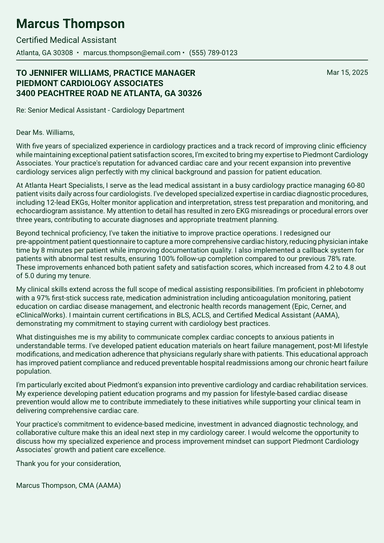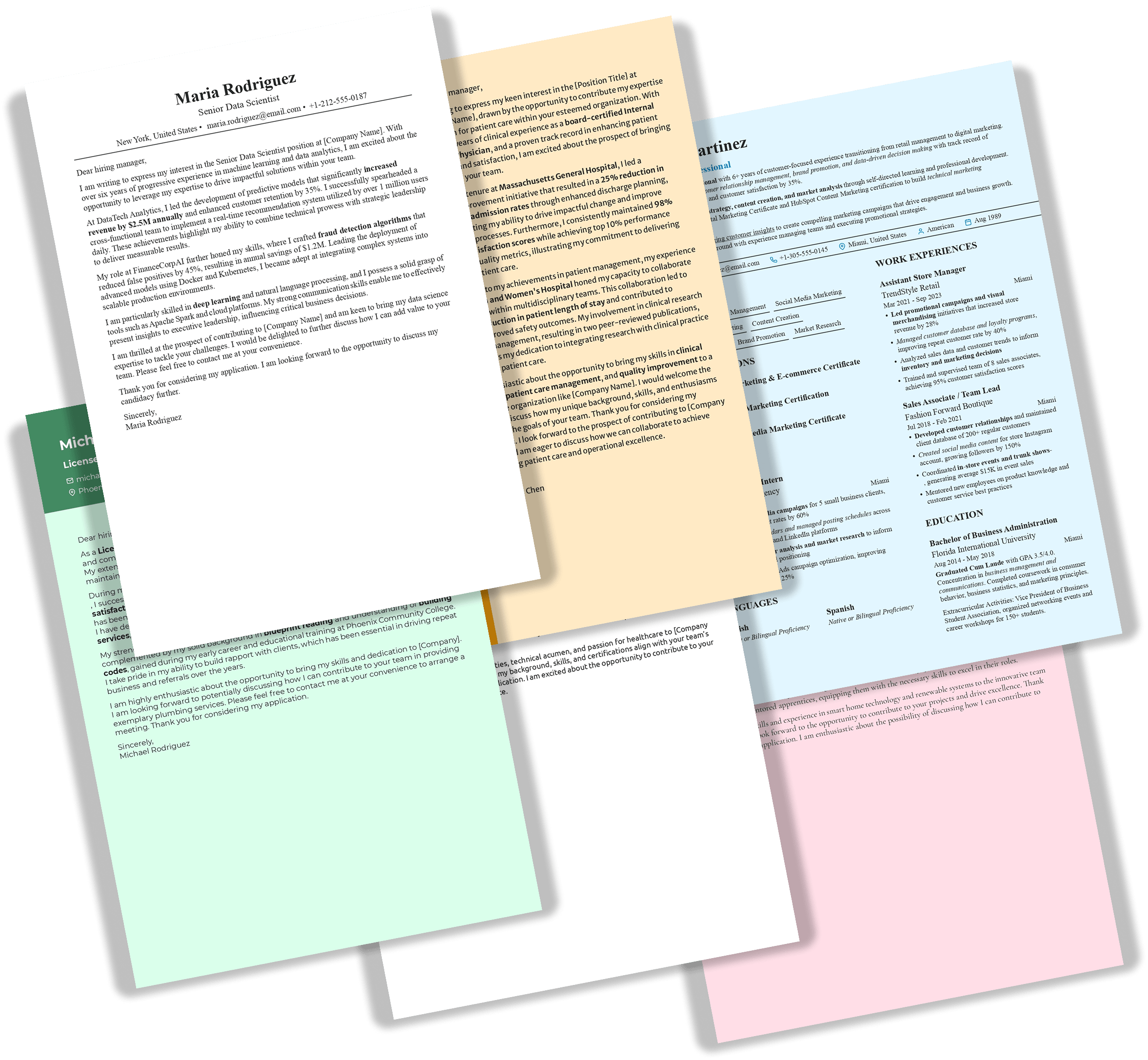How to Write a Medical Assistant Cover Letter [+ 2 Examples]
This complete guide with expert tips and real examples will teach you how to write a compelling cover letter — fast and stress-free!
Edit this cover letter![How to Write a Medical Assistant Cover Letter [+ 2 Examples]](/_next/image?url=https%3A%2F%2Fcdn.sanity.io%2Fimages%2Fbcftoxbw%2Fproduction%2F9d9dfd50a4c37c9c980566340c70d1f69a769718-1190x1683.png&w=1080&q=75)
Knowing how to write a good medical assistant cover letter is essential if you want to stand out in today’s growing healthcare job market. Many candidates rely solely on their resumes, which list skills but fail to convey passion for patient care or ability to thrive in a specific clinical environment. However, with a well-written medical assistant cover letter, you not only highlight your clinical and administrative skills but also show employers why you’re the right cultural and professional fit for their healthcare facility.
In this guide, you’ll learn how to write an effective medical assistant cover letter, what employers look for in it, and the key ways to highlight your expertise. Also, we’ll provide you with cover letter examples and templates you can use when drafting your application.
- Highlight hands-on patient care in your medical assistant cover letter—vital signs, lab work, procedure assistance, equipment operation—with specific examples.
- Showcase EHR management, billing, insurance verification, scheduling, and familiarity with medical software.
- Emphasize empathy, communication, attention to detail, multitasking, teamwork, and HIPAA compliance.
- Personalize each cover letter to the facility, patient population, and role requirements.
- Include CMA, RMA, BLS, ACLS, or other relevant credentials.
- Use clean formatting, error-free writing, and cohesive contact info with your resume.
- End confidently with enthusiasm and a clear next step for follow-up.
What Makes a Strong Medical Assistant Cover Letter?
A strong medical assistant cover letter needs to reflect the unique dual nature of the occupation. The medical assistant position demands professionals who can transition between patient care duties and office management tasks throughout their workday.
Therefore, you need to highlight your clinical competencies—like vital signs measurement, medical procedure assistance, and patient preparation—alongside your administrative capabilities in areas such as medical records management, insurance verification, and patient scheduling.
The demand for medical assistants is growing. The U.S. Bureau of Labor Statistics projects 12% growth in medical assistant employment by 2034, so it’s important to stand out as a candidate. Hiring managers want to see that you comprehend the importance of HIPAA compliance, can communicate effectively with diverse patient populations, and understand how your role supports the broader healthcare team.
Furthermore, your letter should showcase relevant soft skills that are particularly valuable in healthcare: empathy, attention to detail, and the ability to remain calm under pressure while multitasking.
[Visual note: Include infographic showing key elements of effective medical assistant cover letters]
Medical Assistant Cover Letter Examples
Here are two examples of strong medical assistant cover letters. You can use the examples for inspiration, as these demonstrate how to tailor a message based on the career stage.
#1. Entry-Level Medical Assistant Cover Letter
#2. Experienced Medical Assistant Cover Letter
Which Skills to Highlight in Your Medical Assistant Cover Letter?
You need to highlight specific skills that align with what healthcare employers value most. It’s not enough to say you’re “skilled in patient care” or “organized.”
Here are the skills you should focus on and how to highlight them:
- Clinical skills. The clinical side of medical assisting includes patient care tasks like vital signs measurement, assisting in procedures, and lab sample collection. Make sure to highlight specific experiences with equipment, age groups, or treatments.
- Administrative skills. These skills ensure smooth healthcare operations. Key areas include managing electronic health records, insurance verification, billing, and scheduling. Experience with platforms like Epic or Cerner, accuracy in documentation, and knowledge of medical coding highlight your value.
- Soft skills. This skills group includes empathy, clear communication, and calm reassurance under pressure. Attention to detail prevents errors, while multitasking ensures efficiency. Furthermore, collaboration, confidentiality, and HIPAA compliance demonstrate professionalism. All of these interpersonal and ethical abilities build trust, improve patient outcomes, and support healthcare team operations.
However, theory is nothing without practice, so here’s a good example of how to incorporate skills in your letter:
In my previous role at XYZ Clinic, I balanced both clinical and administrative responsibilities that mirror the needs of your facility. I assisted with diagnostic procedures, collected and processed lab samples, and operated EKG equipment, ensuring patient comfort while maintaining accuracy. On the administrative side, I managed patient records in Epic and processed insurance claims, helping reduce billing errors by 15%. Just as importantly, I consistently communicated with patients in a clear and compassionate way—whether preparing them for procedures or explaining post-care instructions—which contributed to higher patient satisfaction scores for our team.
How to Write a Medical Assistant Cover Letter in 5 Simple Steps
Writing a strong medical assistant cover letter requires the same careful planning as delivering excellent patient care. Since more than 80% of recruiters expect a cover letter, you don’t want to approach this step unprepared.
Let’s examine five key steps in creating an effective medical assistant cover letter so you can prepare the best way possible.
#1. Research the Healthcare Facility
Understanding your target healthcare facility goes far beyond reading their "About Us" page. You need to do the research on their patient demographics, specialty areas, organizational culture, and current challenges or initiatives.
For example, if you're applying to a practice that serves a large senior population, emphasize your experience with geriatric patients and age-related health conditions. If the facility specializes in women's health, highlight relevant experience and your understanding of gender-specific healthcare needs.
Additionally, look for recent news about the organization, new service offerings, quality improvement initiatives, or expansion plans. This information helps you connect your background to their current needs and demonstrates genuine interest in their specific goals.
Furthermore, knowing their patient volume, appointment scheduling challenges, or recent technology implementations can help you position your experience as solutions to their operational needs.
#2. Match Your Skills to Job Requirements
Every medical assistant job posting provides clues about what the employer values most. Create a two-column analysis with job requirements on one side and your matching qualifications on the other.
Make sure to not just list skills—explain how you've applied them and what results you achieved. If they're seeking someone with "strong organizational skills," describe specific systems you've implemented or improvements you've made rather than simply stating you're "highly organized."
Also, pay attention to required versus preferred qualifications. If you're missing a preferred requirement, acknowledge it briefly while emphasizing your willingness to learn and relevant transferable skills. Sometimes employers are flexible on specific requirements if you demonstrate strong foundational abilities and genuine enthusiasm for professional development.
#3. Use Healthcare-Specific Language
Incorporating medical terminology appropriately shows your expertise, but balance is crucial. You want to demonstrate professional competency without making your letter difficult for non-clinical hiring managers to understand.
Use specific terms for procedures you've performed, equipment you've operated, and conditions you've worked with, but always in context that explains your role and competencies. However, avoid outdated terms or those that might vary by region or facility type.
When in doubt, mirror the language used in the job posting or on the organization's website. This approach shows you're familiar with their communication style and can adapt to their organizational culture.
#4. Show Knowledge of Medical Software
Electronic health records and practice management systems are integral to modern medical practice, so demonstrating software knowledge can set you apart from other candidates. Rather than simply listing software names, explain how you've used these systems to improve efficiency, accuracy, or patient satisfaction. If you have experience with the specific system used by your target employer, definitely mention it prominently.
Even if you haven't used their exact system, emphasize your ability to learn new technologies quickly and provide examples of how you've successfully adapted to software transitions in previous roles. Many practices appreciate candidates who can help train other staff members or assist with system implementations.
#5. Close Strongly
End your medical assistant cover letter with confidence and a clear next step. Reaffirm your enthusiasm for the role and suggest a follow-up action, such as a call to an interview.
Here’s an example:
I’d welcome the opportunity to discuss how my clinical and administrative skills can support your healthcare team in delivering excellent patient care. I look forward to the chance to meet and share more about my qualifications.
This approach shows initiative and professionalism—qualities every healthcare employer values.
Medical Assistant Cover Letter Template
Now that you’ve learned how to write a medical assistant cover letter, here's a template you can customize for your specific situation and target position:
Your cover letter header should maintain consistency with your medical assistant resume to create a cohesive application package. Use the same font, styling, and contact information formatting across all documents.
3+ Common Medical Assistant Cover Letter Mistakes to Avoid
Even the most qualified medical assistants can hurt their chances with cover letter mistakes. Employers in healthcare value precision, professionalism, and genuine interest—and your letter should reflect that.
Let’s see which mistakes to avoid when writing your medical assistant cover letter.
Using the same cover letter for every application is one of the fastest ways to get rejected. Even if you're applying to multiple similar positions, each letter should be customized with specific facility names, relevant experience highlights, and tailored explanations of why you're interested in that particular opportunity.
The most obvious signs of generic letters include:
- Incorrect facility names
- Generic job titles
- Vague statements that could apply to any healthcare setting
Take time to research each potential employer and write personalized opening paragraphs that demonstrate genuine interest and knowledge about their services, patient populations, or recent achievements.
While your education and certifications are important, employers want to know how you've applied your knowledge in real healthcare settings. Recent graduates often make the mistake of listing coursework without connecting it to practical applications or demonstrating how their training prepared them for the specific challenges of medical assisting.
Instead of just mentioning that you completed clinical rotations, describe what you learned, how you handled challenges, and feedback you received from supervisors. Even volunteer experiences or part-time roles in healthcare settings can provide valuable examples of your commitment to the field and practical skills development.
Healthcare employers take patient privacy seriously, and failure to mention your understanding of confidentiality requirements can be a red flag. HIPAA compliance isn't just about following rules—it represents your professional ethics and understanding of patient rights. Briefly mention your training in privacy regulations and provide examples of how you've protected patient information in previous roles.
This is particularly important if you're transitioning from a non-healthcare field, as it demonstrates your awareness of the unique responsibilities that come with access to sensitive medical information.
Formatting matters as much as the content, especially in healthcare, where professionalism and attention to detail are crucial.
Make sure to:
- Use clean, readable fonts, appropriate spacing, and consistent formatting throughout.
- Avoid decorative elements, unusual colors, or unprofessional email addresses that might detract from your message.
- Ensure your contact information matches your resume exactly
- Proofread carefully for spelling and grammar errors
Tips for Medical Assistant Job Applications
Creating a successful medical assistant job application requires coordination between your cover letter and resume to tell a cohesive story about your qualifications and career goals. Your cover letter should complement, not repeat, the information in your resume by providing context, personality, and specific examples of your achievements.
Consider creating a master document with all your accomplishments, skills, and experiences, then selecting the most relevant pieces for each specific application.
Interview preparation should begin while you're writing your cover letter. The stories and examples you include in your letter may come up during interviews, so be prepared to expand on them with additional details and outcomes. Research common interview questions and practice explaining how your background aligns with the role's requirements.
Follow-up is crucial. Send a brief, professional thank-you email within 24 hours of any interview, reiterating your interest and highlighting any key points from your conversation. If you haven't heard back within the timeframe they specified, a polite follow-up call or email shows continued interest without being pushy.
Use ResumeBuilder.so to Create a Personalized Medical Assistant Cover Letter
Use our AI-powered builder and professional cover letter templates to craft documents that highlight your clinical, administrative, and interpersonal skills. ResumeBuilder.so ensures your application passes ATS screenings and reaches healthcare hiring managers, helping you stand out in the healthcare job market.
Final Thoughts
A well-written medical assistant cover letter is your introduction to potential employers and the first opportunity to demonstrate your communication skills, attention to detail, and professional demeanor that are essential in healthcare settings.
Remember that healthcare employers are looking for candidates who understand both the technical requirements and the human side of medical care. Your medical assistant cover letter should convey not just what you can do, but why you're passionate about doing it and how you'll contribute to creating positive patient experiences.
Medical Assistant Cover Letter FAQ
#1. What should I include in a medical assistant cover letter?
You should include your relevant clinical and administrative skills, healthcare experience or training, professional certifications like CMA or RMA, and specific examples of achievements in medical settings. Most importantly, demonstrate your genuine passion for patient care and explain why you're interested in that particular healthcare facility or practice specialty.
#2. How long should a medical assistant cover letter be?
Keep the length of your cover letter to one page, typically 3-4 well-developed paragraphs. This allows you to provide sufficient detail about your qualifications while respecting the hiring manager's time and demonstrating your ability to communicate concisely.
#3/ Should I mention certifications in my cover letter?
Yes, especially relevant certifications like CMA (Certified Medical Assistant), RMA (Registered Medical Assistant), or CCMA (Certified Clinical Medical Assistant). These credentials demonstrate your professional credibility, commitment to the field, and readiness to begin contributing immediately to patient care.
#4. How do I write a cover letter with no medical experience?
Focus on transferable skills from other roles, relevant education or coursework, volunteer work in healthcare settings, and demonstrate genuine enthusiasm for learning and patient care. Emphasize qualities like attention to detail, customer service experience, ability to work under pressure, and any exposure to medical environments through internships or clinical rotations.
#5. What makes a medical assistant cover letter stand out?
Personalization for the specific practice, concrete examples of achievements with quantified results, demonstration of both clinical and administrative competencies, and genuine passion for patient care make cover letters memorable. Including knowledge of the facility's specialties, patient population, or recent initiatives shows you've invested time in research and are serious about the opportunity.
#6. Should I use medical terminology in my cover letter?
Use medical terminology appropriately and naturally to demonstrate your expertise, but avoid excessive jargon that might make your letter difficult to read. Strike a balance that shows professional competence while maintaining clarity for all potential readers, including HR professionals who may not have clinical backgrounds.


